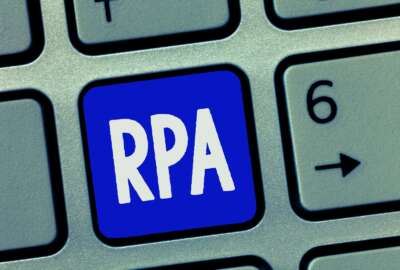

Bots powered by robotic process automation at the Defense Logistics Agency face limits based on the amount of time a human operator stays logged into the network.
Bots powered by robotic process automation at the Defense Logistics Agency face limits based on the amount of time a human operator stays logged into the network. But the agency plans to ramp up its bot production this year and let them work well past closing time for most employees.
John Lockwood, DLA’s RPA manager, said the agency has about 20 bots running, and another 30 in production. By the end of September, the agency will have at least 75 online.
“We’re constantly delivering, Lockwood said Thursday at a UiPath and Carahsoft conference. “We’re delivering bots every two weeks [and] we’re starting bots every two weeks. It’s a production run, it’s a factory line, and it’s a different way of thinking.”
On average, it takes about 200 hours to develop a single case that, once the bot’s online, can save the workforce hundreds or thousands of labor hours each year.
But for all the hype and aspirational talk, Lockwood cautioned that RPA isn’t a one-size-fits-all solution. When a new idea for a bot comes into the agency, Lockwood said two questions come to mind: Can RPA solve the problem, and should it?
“Some people come up to me and say, ‘Hey, I really want to do this because this would save me 20 hours a year.’ Well sorry, [but] to save you 20 hours a year is not a good [return on investment],” Lockwood said. “But if it’s saving 20 people 20 hours a year, then we have good ROI.”
While the Trump administration has plans to provide an AI roadmap for agencies, several have already found success with RPA pilots that have freed up federal employees from doing menial aspects of their jobs.
“I would say rather than AI, if we’re doing a lot of repetitive things, focus on robotic process automation,” Paul Tibbits, the executive director of the Office of Technical Integration the Department of Veterans Affairs, said during a panel discussion at Broadcom’s Mission to Modernize conference. “Take a 30-minute process and reduce it to three seconds. I think our RPA is ready now, where it’s suitable.
Rear Adm. Danelle Barrett, director of the Navy’s cybersecurity division, said AI has become more than just a buzzword.


When trying to introduce automation at an agency, National Science Foundation Chief Information Officer Dorothy Aronson said she recommends finding a use case that “serves your whole agency.”
“Don’t pick a problem that’s just an HR problem, or just an IT problem, or just a business problem. It has to be something that appeals to everyone,” Aronson said.
Lockwood echoed similar sentiments, adding that once an idea for a bot gets the green light, his team keeps end-users in the loop at all stages of development.
“The key is we’re working with the customers every week,” he said. “We’re constantly connecting back and forth. We’re not going into a closet for two weeks, coming back and saying, ‘Did we get this right?’”
While RPA tools at their full potential can run 24-hours a day, DLA has plans in motion to overcome the security hurdles that keep from doing so. Currently, the agency has attended bots running, which a human operator can run on a secured network while logged on using their Common Access Card (CAC).
“We’re now on attended [bots] only during the day, only eight hours when someone’s there, because they have a security problem when they leave and they pull that [CAC] card,” Lockwood said.
However, DLA has plans to soon roll out is “unattended bots,” which have their own certificates that can access CAC-enabled sites. About 20 of the agency’s bots are attended, while the remainder are a “hybrid” between attended and unattended. But within the next couple of months, Lockwood said the agency should have about 50 unattended bots running 24/7, every day of the year.
“The bots have their own access and the bots have their own certificates. And the bots can go and access these CAC-enabled sites in the middle of the night — Christmas Eve, Christmas Day, New Year’s Eve at 1 a.m.,” Lockwood said.
Copyright © 2024 Federal News Network. All rights reserved. This website is not intended for users located within the European Economic Area.
Jory Heckman is a reporter at Federal News Network covering U.S. Postal Service, IRS, big data and technology issues.
Follow @jheckmanWFED
